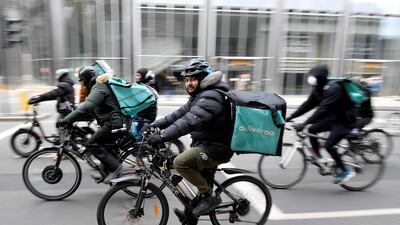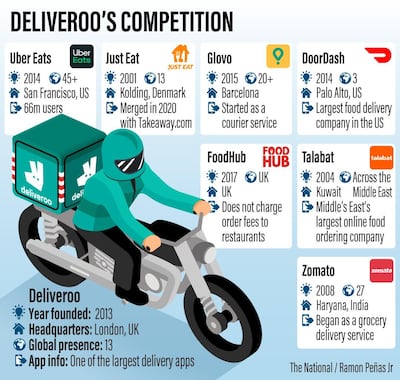Deliveroo's orders and sales more than doubled in the first quarter of this year, in its first trading update since its disastrous debut on the London Stock Exchange last month.
The British food delivery start-up reported a 114 per cent surge in orders to 71 million in the first three months of 2021 from the same period a year ago – the fourth consecutive quarter of growth.
The company’s gross transaction value rose 130 per cent year-on-year to £1.65 billion ($2.27bn), while the number of customers using the platform each month climbed by a record 91 per cent on the year to 7.1 million.
Will Shu, Deliveroo’s founder and chief executive, said he was delighted with the first-quarter results, with demand strong in both the UK and Ireland, as well as international markets driven by record new consumer growth and sustained engagement from its existing consumers.
“This is our fourth consecutive quarter of accelerating growth, but we are mindful of the uncertain impact of the lifting of Covid-19 restrictions,” Mr Shu said on Thursday.
“So while we are confident that our value proposition will continue to attract consumers, restaurants, grocers and riders throughout 2021, we are taking a prudent approach to our full-year guidance.”
Deliveroo said it was difficult to know how much of the growth was driven by lockdown when eating out at restaurants and cafes was banned, and that it expected the rate of growth to slow as restrictions eased.
However, the company still expects full-year sales to rise by 30 to 40 per cent with gross profit margins of 7.5 per cent-8 per cent.
Deliveroo listed on the LSE with a valuation of £7.59bn on March 31, in the largest initial public offering in the UK capital for a decade.
The app-driven meals delivery group raised £1.5bn in the IPO, with its offering priced at £3.90 per share, the bottom of its target range.
However, the share price plunged 26 per cent on the first day of trading, wiping more than £2bn off the value of the company.
The disastrous debut was plagued by criticism, with institutional funds deterred by its dual-class share structure that allows Mr Shu to retain control of the business for three years, as well as the company’s gig-economy model.
On Thursday, the stock was at £266.9 at 9.12am London time, more than 30 per cent down on the debut price.
"Those hoping for a rebound in Deliveroo shares after the Q1 update have been disappointed afresh, with the shares taking another turn lower despite the anticipated bounce in order volumes," said Chris Beauchamp, chief market analyst at online trader IG.
"Crucially, fears about a changing environment thanks to the end of lockdown restrictions appear to be justified, with the firm leaving guidance unchanged and noting that the end of ‘special circumstances’ would make it hard to issue accurate forecasts for the coming few months."
Deliveroo said growth in the UK and Ireland was driven by new customers with orders growing 121 per cent year-on-year to 34 million as the pandemic takeaway boom continued during the third lockdown in England, with London recording gross transaction value growth of 120 per cent on the year.
The company’s international segment, which includes operations in the Middle East, also registered strong growth, with orders growing 108 per cent in the first quarter compared to the same three months in 2020.
Deliveroo said the pandemic and accompanying lockdown restrictions had “an uneven impact” across the countries in which it operates, however, the international portfolio still grew 24 per cent in the first quarter from last year.
The company has more than 100,000 riders across the globe and has received criticism in the UK for offering neither sick leave nor holiday pay.
Earlier this month, scooter and bicycle delivery riders waving flags and red smoke flares rode through the streets of central London to protest against unfair working conditions.
The Independent Workers’ Union of Great Britain, representing the riders, called for them to be paid the minimum wage, currently £8.91 per hour for over-23s, and for additional safety measures.
However, Deliveroo said on Thursday that rider satisfaction was at an all-time high of 89 per cent at the end of the first quarter



